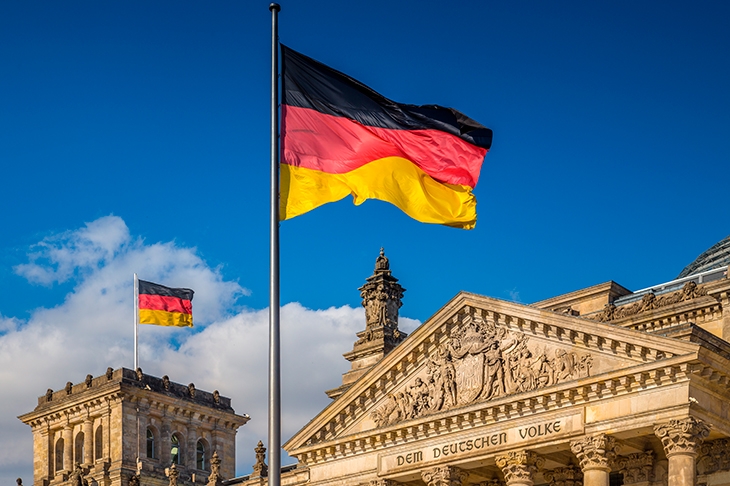The situation in Afghanistan has suddenly dominated the debate in the middle of a sluggish German election campaign. Candidates to succeed Angela Merkel are having to declare their positions. Military intervention is out of the question without US backing. The question then becomes a repeat of the Syrian crisis: will Germany once again open its doors to potentially hundreds of thousands of refugees and migrants?
It’s an unequivocal ‘nein’ from the government. ‘There will not be another 2015’ came the strong response from the ruling coalition of Angela Merkel’s CDU/CSU and the SPD. The Green party, currently in opposition but the second strongest party in most polls, are fudging the issue. With serious ambitions for the chancellorship, they need to outline a clear vision of what a Green government’s foreign policy would be.
The developments in Afghanistan should have provided a welcome opportunity for Annalena Baerbock, the Green chancellor candidate. Foreign policy has been a continuous strand in her life: she participated in the Young Global Leaders programme of the World Economic Forum, and worked a dissertation on humanitarian aid (although didn’t complete it).
Would a Chancellor Baerbock be principled enough to snub China?
Yet the campaign has pushed Baerbock into the background. She acted cautiously during the recent flooding, worried about coming across as opportunistic. Meanwhile, the candidates from the established parties wandered the flooded villages, patted backs and promised government action.
Baerbock’s image was also damaged when a light was shone on irregularities in her CV, forgotten expenses claims and allegations of plagiarism in her recently published book. The Greens have lost nearly 10 percentage points in many polls. There is now even speculation whether the party might put forward her co-leader Robert Habeck as the candidate for the chancellorship.
Afghanistan gives Baerbock a real chance to halt her and her party’s slump. There is an appetite in Germany for more assertive leadership on the global stage, and once looked like the one candidate who could promise this. She has been critical of the Nord Stream 2 gas pipeline from Russia to Germany, saying that, ‘we cannot finalise this project,’ despite it nearly being completed at a cost of €9.5 billion.
However, such clarity has been missing so far from Baerbock’s response to Afghanistan. She was quick to criticise the government’s sluggish response, but she is guilty of wavering on the issue herself. In her time as an MP, she voted for German military intervention with Nato back in February 2014. But when it came to Germany’s role in rebuilding the country after the Taliban’s hopeful demise, she abstained for seven years. Her support for intervention without a plan for what comes next does not bode well for a future government that will almost certainly involve her. German voters agree: currently only 23 per cent think she is fit to be chancellor.
The closest the Green party has come to the chancellorship so far was with their candidate Joschka Fischer, who served as vice chancellor and foreign minister under Gerhard Schröder from 1998-2005. In this capacity, he pragmatically abandoned his party’s pacifist principles and agreed to support Germany’s involvement in Afghanistan. He stood shoulder to shoulder with Baerbock on Tuesday when he reiterated that the decision was right at the time as it showed solidarity with Germany’s most important ally, the US.
Both Baerbock and Fischer also used the electioneering opportunity yesterday to condemn the ‘callous’ nature of the withdrawal. Both demanded that ‘at least a five-digit number’ of Afghan allies should be allowed to seek refuge in Germany. Fischer went further, hinting at a repeat of 2015: ‘What do you tell a young woman who doesn’t want to live under the Taliban regime? Do we want to say to her, “No, not here with us?” I don’t think we will be able to.’ Baerbock stopped short of this, characteristically unable to answer the question. She is being pulled apart by two forces: a 2015-style open door is politically untenable, yet denying Afghan refugees asylum would look hypocritical from a leader who has argued for a more ethical foreign policy.
Whoever takes over in the autumn will have some serious foreign policy dilemmas to deal with. After 16 years of Merkelian indecision, of Germany trying to square the circle of aligning themselves with Russia and China for economic reasons while staying friendly with the west, the country’s leadership is finding out that it cannot have its cake and eat it. Would a Chancellor Baerbock be principled enough to snub China, Germany’s biggest trading partner, over human rights abuses? Would she have a plan for Afghanistan? Could she look Putin in the eye and tell him that Nord Stream 2 is cancelled? Given her muddled responses throughout the campaign, Germans have every right to be doubtful.







Comments